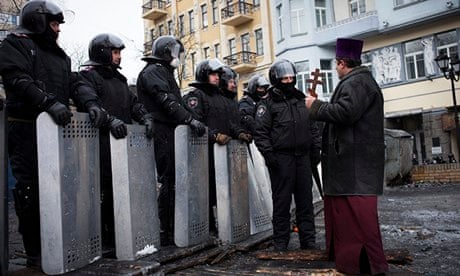Ukraine's parliament is considering measures to grant amnesty to those arrested during weeks of protests, but possibly with conditions attached that would be unacceptable to the opposition.
Two amnesty proposals are up for a parliamentary vote on Wednesday, one of which says amnesty would be granted only if demonstrators left the streets and vacated buildings that they occupy.
Over the course of two months, anti-government protesters have established a large tent camp in the main square of Kiev and seized three buildings that they use as operations centres and sleeping quarters. They have also put up barricades of ice, wood and other materials.
Leonid Kravchuk, Ukraine's first-post independence president, urged deputies to come to an agreement on the amnesty issue, warning that the country was "on the brink of civil war".
"It is a revolution. It is a dramatic situation in which we must act with the greatest responsibility," Kravchuk – president from 1991 to 1994 – said to applause and a standing ovation.
One group of protesters clashed with another on Wednesday in an attempt to free a government building in the centre of Kiev, which they had seized. At least two protesters were injured.
Andriy Khoronets, an activist with the Svoboda party which represents more moderate protesters, tried to force members of the more militant Spilna Sprava group to vacate the agriculture ministry building as part of a compromise with the government.
"We must be seen as people who can fulfil one's obligations," Khoronets told the Associated Press outside the building. "There should be no anarchy."
On Tuesday, in what appeared to be a significant concession to the opposition, Yanukovych accepted the resignation of his hardline prime minister, Mykola Azarov, and his government. It remains to be seen whether the pro-Russian president will seek to include opposition figures in a new government and whether the opposition would agree. The central demand from the protesters is Yanukovych's resignation and early presidential elections.
Yanukovych also caved in on Tuesday to pressure from the opposition, Europe and the US by promising to scrap repressive legislation passed a fortnight ago curbing freedom of speech and assembly. Critics suggested they in effect ushered in a dictatorship.
The moves came after four rounds of talks between the embattled president and three opposition leaders.
Ukraine's parliamentary vote comes after the Nato secretary general, Anders Fogh Rasmussen, weighed into the tug of war for influence in the country on Wednesday morning, criticising Russia for pressuring Kiev not to sign a free trade pact with the EU.
"An association pact with Ukraine would have been a major boost to Euro-Atlantic security. I truly regret that it could not be done," Rasmussen told Le Figaro daily. "The reason is well known: pressure that Russia exerts on Kiev."
Rasmussen also condemned police violence against the protesters and pressed Ukraine's leaders to assert their independence, urging closer ties with Nato and the EU.
His comments came a day after the Russian president, Vladimir Putin, warned Europe to keep its hands off Ukraine, as Brussels sent its top foreign policy envoy, Catherine Ashton, to Kiev to try to mediate in the standoff.
Putin told a meeting of EU leaders: "The more intermediaries there are, the more problems there are. I am not sure Ukraine needs intermediaries." He pointedly noted that European leaders would have complained if Russia had sent envoys to mediate in the Greek crisis of the past four years.
"I can only imagine what the reaction would be if in the heat of the crisis in Greece or Cyprus, our foreign minister came to an anti-European rally and began urging people to do something. This would not be good," Putin said.
The street revolt against Yanukovych erupted in November after he reneged on free trade and political integration pacts with the EU, turning to Moscow, which offered him $15bn (£11bn) in loans and reduced energy prices.

Comments (…)
Sign in or create your Guardian account to join the discussion